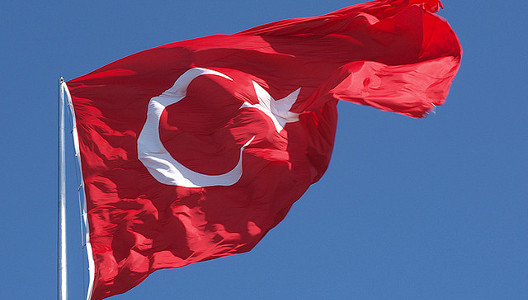
A Prime Minister Aims to Become President, and Then Concentrate Power in His New Job
ISTANBUL — Turkey’s voters are likely this month to elect Prime Minister Recep Tayyip Erdoğan to a new job as the country’s president, putting him on a path to re-write the constitution and forge a more centralized, presidential government.
After eleven years as prime minister, Erdoğan is barred from running for re-election next year by a three-term limit enforced by the rules of his Justice and Democracy Party (AKP). His switch to the presidency is likely to continue, and perhaps accelerate, an erosion in Turkish democracy, several analysts say. That puts at risk Turkey’s role of recent years as a model of stability and democratization in the Middle East and the Eurasian region.
Erdoğan’s authoritarian inclinations of recent years have weakened Turkish democracy, particularly in this year’s purges of police and judicial officials that followed corruption charges in December against members of his cabinet, say analysts such as the Atlantic Council’s Istanbul-based senior fellow, Sabine Freizer. The authoritarianism and corruption have mobilized opposition to Erdoğan among Turkey’s intellectual elite and middle classes, as dramatically shown by last year’s widespread protests and political crisis sparked by popular resistance to government development plans at Istanbul’s Gezi Park. Opinion polls show that he has become an increasingly polarizing figure.
Still, Erdoğan’s AKP “holds the support of working-class voters due to its religiously conservative style and a strong record of economic growth,” political scientist Erik Tillman notes in a recent analysis of research for the London School of Economics. Opinion polls and election analysts in Turkey indicate that he is significantly the strongest of the three candidates for what is Turkey’s first direct election of a president.
It is unclear whether Erdoğan can gather the outright majority of votes in balloting on Sunday to win election in that first round. A poor turnout would favor, and a strong turnout would reduce, his chances for immediate victory. If he falls short of a majority, he will face his main opponent, Ekmeleddin Ihsanoğlu, in a second-round vote August 24.
Ihsanoğlu, Erdoğan’s only serious rival, is backed by the secular, left-leaning Republican People’s Party (CHP) and the Nationalist Movement Party (MHP), traditionally a vehicle for Turkish nationalism. Ihsanoğlu has been hampered by uneven support within this coalition; his previous role as secretary general of the international Organization of Islamic Cooperation (OIC) upsets some secular factions of the CHP.
The third candidate, Selahattin Demirtaş, is co-chairman of the Kurdish nationalist People’s Democratic Party (HDP) – and the six percent of voters who are ethnic Kurds could become an important swing vote if the election goes to a second round. That role for Kurds, if it arises, would give them an unprecedented place at the center stage of Turkish electoral politics, and a new opportunity to press for a political resolution of their longstanding grievances.
Turkey’s presidency already offers levers of authority – to summon the parliament or the National Security Council to meet, for example – that Erdoğan has vowed he would use aggressively. In war, an event that cannot be ruled out amid the Syria and Iraq crises, the presidential role as commander-in-chief would weigh heavily. “I will use my full constitutional competences” as president, he told party colleagues in April. And he will do so in pursuit of his party’s agenda, rather than serving in the presidency’s past role as a neutral arbiter above partisan competition, he said last month.
Turkey has changed its constitution readily, having passed four of them since 1921, when the modern Turkish state emerged from the World War I defeat of the Ottoman Empire. Voters showed their readiness for another change when they approved the formation of a commission to re-write the constitution in 2010. That commission eventually dissolved in a disagreement among the major parties, but not before approving constitutional amendments, including one that gives Turkey’s president the authority to appoint ten of the seventeen justices of the Constitutional Court. That power will let Erdoğan appoint docile justices who will not challenge his constitutional ambitions.
To change the constitution, the AKP will have to pass amendments in parliament with a two-thirds majority, and then win a majority vote in a referendum. The party now holds 58 percent (313 of the total 537) of parliament seats, and hopes to increase that proportion in the 2015 general elections.
The prospect of a centralized, presidential system of governance for Turkey is a troubling prospect, notably under Erdoğan’s guidance, say analysts including Ömer Taşpinar, director of the Turkey Project at Washington’s Brookings Institution. “Erdoğan’s understanding of democracy is indeed based on a simplistic and populist notion of winning elections,” Taşpinar wrote this spring in the Turkish daily Today’s Zaman. “His majoritarian and electoral understanding comes at the expense of individual rights and liberties, an independent media and the freedoms of expression and association. The absence of rule of law as well as problems with the separation of the executive, legislative and judicial powers still condemns Turkey to a second-class category among democracies,” Taşpinar wrote.
Leyla Kravitz is an intern at the Dinu Patriciu Eurasia Center of the Atlantic Council.
Image: (Photo: Flickr/Alphadesigner/CC License)
